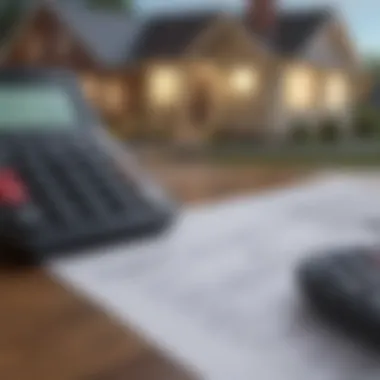Key Financial Considerations for Buying a $300k House: A Comprehensive Guide


Understanding Personal Finances
When you contemplate the significant step of purchasing a $300k house, it is vital to grasp the intricacies of your personal finances. Budgeting techniques serve as fundamental pillars in this realm, enabling individuals to navigate the intricate web of income and expenditures. By diligently tracking expenses, you gain insightful knowledge of your financial habits and areas where adjustments may be warranted. Setting clear financial goals acts as a guiding light, propelling you towards the fiscal discipline necessary for such a substantial investment.
Investing Strategies
Diving into the realm of investing unveils a multitude of possibilities and risks that demand attention. An introduction to investing lays the groundwork, providing insights into different asset classes and avenues for capital growth. Effectively managing risk is pivotal in safeguarding your investments against market fluctuations and unforeseen events. Embracing diversification as a strategy shields your portfolio from excessive vulnerabilities, promoting stability and long-term growth.
Retirement Planning
Planning for your retirement is a crucial aspect that intertwines with the pursuit of homeownership. Exploring retirement savings plans helps in creating a financial safety net for your golden years, ensuring a comfortable and secure future. Understanding social security benefits adds another layer of retirement security, complementing your personal savings efforts. Factoring in healthcare costs is essential, as medical expenses can significantly impact your financial well-being during retirement.
Financial Products Overview
Delving into the landscape of financial products, you encounter a diverse array of investment vehicles catering to various risk appetites and objectives. Savings accounts serve as foundational tools for building reserves and emergency funds, offering liquidity and minimal risk. Navigating the realm of credit cards and loans necessitates prudent decision-making to harness these instruments effectively without falling into debt traps.
Expert Insights and Tips
Seeking guidance from financial advisors can provide valuable perspectives on optimizing your financial strategies and aligning them with your goals. Analyzing market trends empowers you to make informed decisions amid dynamic economic landscapes, leveraging opportunities and mitigating risks. Implementing tax planning strategies optimizes your financial efficiency, maximizing returns and minimizing tax burdens for a robust financial future.
Understanding the Basics
In understanding the basics of how much you need for a $300k house, it is crucial to delve into the fundamental financial aspects that dictate the feasibility of such a purchase. This section lays the groundwork for the intricate calculations and considerations that will follow, offering a clear starting point for aspiring homeowners. From assessing your current financial standing to projecting future expenses, grasping these fundamental concepts is key to making informed decisions regarding real estate investments.
Determining Your Budget
Assessing your current financial situation
Assessing your current financial situation plays a pivotal role in shaping your approach towards affording a $300k house. By meticulously reviewing your income, savings, debts, and credit score, you can ascertain your financial health and pinpoint areas that require attention. This assessment acts as a compass guiding you towards a realistic home buying journey, ensuring that you explore options within your financial means.
Setting a realistic budget based on income and expenses
Setting a realistic budget founded on a meticulous analysis of your income and expenses is paramount in accurately determining how much you can allocate towards a $300k house. Balancing your aspirations with financial prudence is essential to avoid overextension and unexpected financial strain. This approach fosters responsible financial behavior, laying a stable foundation for sustainable homeownership.
Calculating the Down Payment


Understanding down payment options (conventional vs. FHA loans)
Delving into the nuances of down payment options such as conventional and FHA loans is critical in comprehending the initial financial outlay required for a $300k house. While conventional loans demand higher down payments, FHA loans offer a more accessible entry point for prospective buyers with limited funds. Understanding these options empowers buyers to select the most suitable path aligned with their financial circumstances.
Ideas for saving up for a substantial down payment
Exploring innovative strategies to save up for a substantial down payment augments your ability to secure financing for a $300k house. From cutting extraneous expenses to setting up automatic savings transfers, incorporating these ideas into your financial plan accelerates your journey towards homeownership. By diligently adhering to a savings regimen, you pave the way for a smoother down payment process.
Estimating Closing Costs
Breaking down typical closing costs
Breaking down the components of typical closing costs elucidates the additional expenses beyond the house price that buyers need to consider. From title insurance to appraisal fees, understanding these costs avoids last-minute financial surprises and ensures meticulous budgeting. By dissecting each element, buyers can negotiate more effectively and streamline the closing process.
Factors impacting closing costs
Analyzing the factors influencing closing costs sheds light on the dynamic nature of these expenses. Variables like location, property taxes, and lender charges significantly impact the final amount due at closing. Being cognizant of these factors empowers buyers to anticipate costs accurately, making informed decisions throughout the home buying process.
Exploring Financing Options
When delving into the realm of real estate investment, understanding the options available for financing is paramount. Exploring various avenues for securing the necessary capital to purchase a $300k house involves a detailed analysis of traditional mortgages, government-backed loans, and alternative financing methods. By exploring financing options comprehensively, individuals can make informed decisions that align with their financial goals and circumstances.
Traditional Mortgages
Qualifying for a mortgage
In the realm of traditional mortgages, qualifying for a mortgage stands out as a pivotal step towards homeownership. The process of determining eligibility for a mortgage involves assessing factors such as credit score, income stability, debt-to-income ratio, and employment history. Qualifying for a mortgage enables individuals to secure a loan amount based on their financial standing, making homeownership attainable for aspirants. The characteristic flexibility of qualifying for a mortgage lies in its ability to cater to a diverse range of financial profiles, offering a viable path towards property ownership.
Understanding interest rates and terms
Another crucial aspect within traditional mortgages is understanding interest rates and terms. This component plays a significant role in shaping the overall cost of borrowing, influencing monthly payments and the total amount repaid over the loan term. By grasping the intricacies of interest rates and terms, individuals can make informed decisions regarding loan options, choosing structures that align with their financial objectives. The unique feature of interest rates and terms lies in their impact on the affordability and long-term financial implications of homeownership, making them a core consideration for prospective buyers.
Government-Backed Loans
Benefits of FHA, VA, or USDA loans
Government-backed loans, such as FHA, VA, or USDA loans, offer distinct advantages that cater to specific borrower needs. These loans often feature lower down payment requirements, more flexible credit score criteria, and in some cases, lower interest rates compared to conventional mortgages. The benefits of these loans extend to a wider pool of applicants, including first-time homebuyers and those with limited financial resources, providing increased accessibility to homeownership opportunities.


Eligibility criteria for government-backed loan programs
Understanding the eligibility criteria for government-backed loan programs is essential for individuals considering this financing option. These criteria typically include factors such as military service (for VA loans), property location (for USDA loans), and specific credit score thresholds (for FHA loans). By meeting the eligibility requirements, prospective buyers can avail themselves of the benefits afforded by government-backed loan programs, ensuring a smoother path towards acquiring a $300k house.
Private Lenders and Alternative Financing
Exploring options beyond traditional banks
For individuals seeking alternative financing routes, exploring options beyond traditional banks opens up a diverse array of loan products and structures. Private lenders and alternative financing institutions offer bespoke solutions tailored to individual financial profiles, accommodating unique needs and preferences that may not align with conventional lending norms. The advantage of exploring these options lies in the potential for customized financial arrangements that cater to specific circumstances, granting a higher degree of flexibility in the borrowing process.
Considerations when choosing a lender
When evaluating different lenders in the realm of private financing, considerations such as interest rates, repayment terms, and customer service play a crucial role in the decision-making process. Choosing a lender entails a detailed assessment of the lender's reputation, transparency in lending practices, and alignment with the borrower's long-term financial objectives. The unique feature of considering various lenders lies in the opportunity to secure favorable loan terms and conditions that optimize the cost of borrowing, fostering a sustainable financial arrangement for the acquisition of a $300k house.
Budgeting for Ongoing Expenses
In the grand scheme of finalizing a $300k house purchase, adeptly addressing budgeting for ongoing expenses serves as a pivotal stage not to be underestimated. Formulating a clear financial plan encompassing the post-purchase stages is crucial for ensuring long-term financial stability and mitigating unforeseen financial burdens. By meticulously accounting for property-related expenses beyond the initial investment, individuals can prepare themselves for the financial obligations tied to homeownership over time. This section will delve into various elements such as property taxes, insurance, maintenance, repairs, utility expenses, and homeowner association fees, shedding light on the significance of diligent budgeting for ongoing expenses.
Property Taxes and Insurance
Understanding property tax rates in your area:
Amidst the complex realm of real estate acquisitions, understanding the nuances of property tax rates in your specific area emerges as a critical determinant in gauging the overall financial obligations tied to homeownership. Property tax rates vary significantly based on the location of the property and can substantially impact the annual financial outlay for homeowners. Adroitly comprehending the intricate details of property tax assessments in your locality empowers individuals to make informed decisions regarding their real estate investments. This insightful section will elucidate the key considerations associated with property tax rates and their implications on the financial dynamics of owning a $300k property.
Selecting the right home insurance coverage:
Equally essential in the realm of ongoing property expenses is the judicious selection of appropriate home insurance coverage. Home insurance acts as a safeguard against unforeseen circumstances, providing financial protection in instances of property damage, natural disasters, or liability claims. Navigating through the myriad of home insurance options to pinpoint the most suitable coverage tailored to individual needs is paramount for ensuring comprehensive protection without incurring excessive financial strain. This informative section will explore the nuances of selecting optimal home insurance coverage and its role in fortifying the financial well-being of homeowners investing in a $300k property.
Maintenance and Repairs
Setting aside funds for regular upkeep:
Allocating funds for routine maintenance stands as an indispensable aspect of prudent homeownership, aimed at preserving the property's structural integrity and aesthetic appeal over time. Setting aside a dedicated budget for regular upkeep enables homeowners to proactively address maintenance issues before they escalate into costly repairs, fostering a habit of responsible property management. This segment will expound on the significance of budgeting for ongoing maintenance and its overarching impact on the long-term value and functionality of a $300k property.
Dealing with unexpected repair costs:
In the realm of homeownership, unexpected repair costs loom as an inevitable reality that necessitates astute financial planning and preparedness. Anticipating unforeseen repair expenses and devising contingency plans to handle sudden maintenance emergencies are prudent practices that shield homeowners from incurring sudden financial strains or jeopardizing the property's condition. This section will delve into strategies for effectively managing unexpected repair costs, offering insights into navigating financial uncertainties with resilience and foresight.


Utilities and Homeowner Association Fees
Estimating monthly utility expenses:
Efficiently estimating monthly utility expenses plays a pivotal role in financial forecasting for prospective homeowners, enabling them to gauge the ongoing operational costs associated with homeownership. Estimating utilities encompassing electricity, water, heating, and other essentials allows individuals to formulate realistic budgets and make informed decisions regarding property affordability and sustainability. This segment will dissect the intricacies of estimating monthly utility expenses and their instrumental role in comprehensive budgeting for a $300k property purchase.
Considering HOA fees for planned communities:
In the realm of planned communities, considering homeowner association (HOA) fees emerges as a fundamental financial consideration tied to communal living arrangements. HOA fees cover shared amenities, maintenance services, and community enhancements, contributing to the overall quality of life within the community. Delving into the specifics of HOA fee structures and their implications on residents provides valuable insights for individuals contemplating property investments in planned environments. This section will unravel the unique features of HOA fees for planned communities, shedding light on their pros and cons in the context of acquiring a $300k property.
Planning for Future Financial Stability
In the realm of real estate acquisition, Planning for Future Financial Stability is a pivotal facet that demands meticulous attention. Ensuring sustainable financial well-being post-investment is paramount in buying a $300k house. This section unveils strategic approaches to secure a stable financial future amidst the intricacies of homeownership.
Building Equity and Wealth
Understanding how homeownership contributes to long-term wealth
Delving into the intricate dynamics of how homeownership catalyzes long-term wealth accumulation is crucial within the scope of this comprehensive guide. By comprehending the mechanisms through which owning a property nurtures financial growth over extended periods, individuals can seize upon the wealth-building potential inherent in real estate investments. This section sheds light on the enduring advantages of homeownership, emphasizing its role as a cornerstone in fostering financial stability.
Strategies for building equity over time
Exploring the nuanced Strategies for building equity over time unravels a tapestry of techniques that fortify one's financial standing. By dissecting the strategic maneuvers that prioritize equity accumulation, this segment elucidates practical pathways to augmenting one's net worth through astute property ownership. Readers are acquainted with the diverse tactics for fortifying equity reserves, equipping them with the requisite insights to navigate the realm of wealth enhancement effectively.
Financial Planning and Risk Management
Creating a financial safety net
Within the paradigm of financial prudence lies the indispensable act of Creating a financial safety net, integral to fostering long-term financial stability. It serves as a buffer against unforeseen fiscal adversities, bolstering one's resilience in the face of economic uncertainties. This section espouses the virtues of cultivating a robust financial safety net, accentuating its pivotal role in fortifying one's financial foundation.
Diversifying investments for financial security
Delving into the realms of diversified investment strategies underscores a thoughtful approach to fortifying financial security. By navigating the nuances of diversification, individuals can shield their financial portfolios against volatility and enhance overall stability. This segment expounds on the merits of diversifying investments, steering readers towards a well-rounded approach to safeguarding and expanding their financial assets.
Retirement and Real Estate Investments
Integrating real estate into retirement planning
The integration of real estate into retirement planning heralds a strategic move towards a secure post-career financial landscape. Exploring the interplay between real estate acquisitions and retirement aspirations illuminates a path towards sustained financial well-being in the golden years. This segment accentuates the role of real estate in fortifying retirement funds, offering a prudent avenue for maximizing long-term financial security.
Maximizing returns on real estate investments
Unpacking the strategies for Maximizing returns on real estate investments underscores the essence of astute financial maneuvering in the realm of property ownership. By optimizing investment returns through shrewd decision-making and informed choices, individuals can augment the profitability of their real estate ventures. This section delves into the intricacies of enhancing returns on real estate investments, empowering readers to leverage their property holdings for maximal financial gain.







